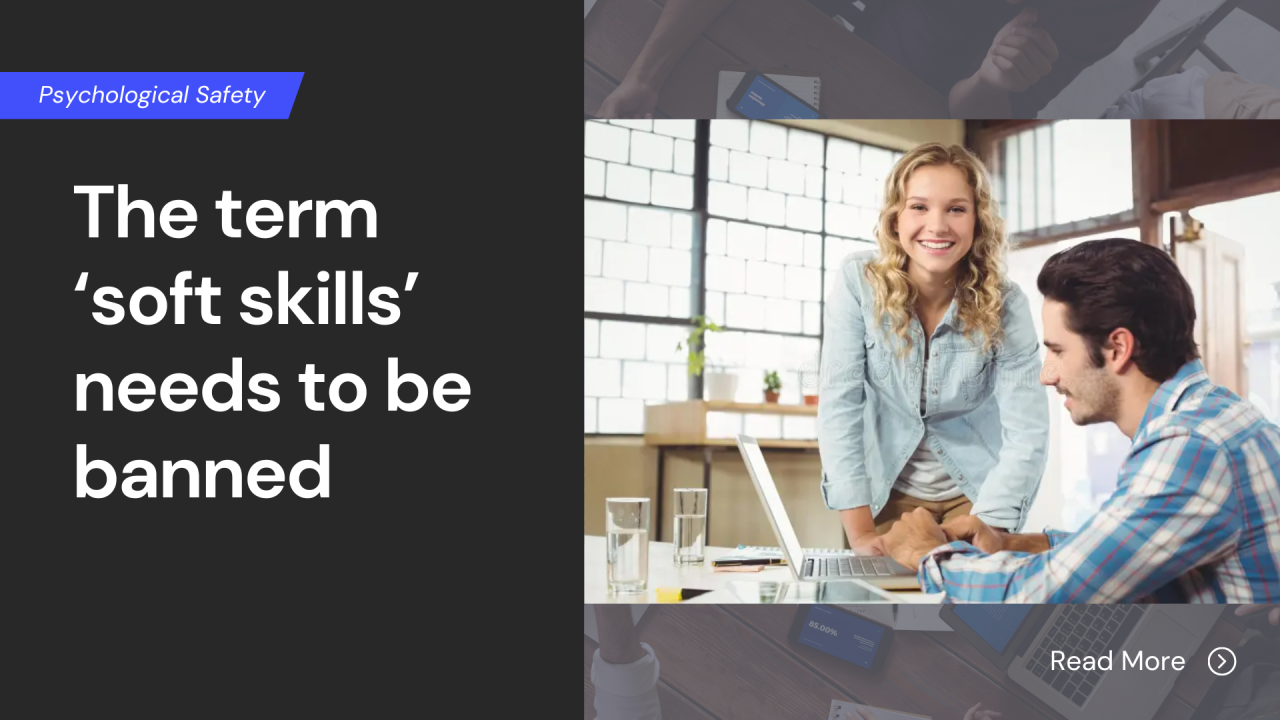The term ‘soft skills’ needs to be banned

I am not a fan of the phrase ‘soft skills.’ It’s a derogatory term that under values important leadership essentials like communication and connection. McKinsey point out teams spend a lot of time on strategy, direction and growth, and rightly so. But not enough time on the quality of interaction of the team. And by this they specifically mean effective dialogue and leveraging and utilising diverse viewpoints.
Two in five colleagues in every meeting are not sharing great ideas or voicing important concerns. People in every organisation, regardless of industry are withholding information, suppressing critical opinions, or falling in line behind weak strategies to keep the peace. Why? Fear of retribution. And most leaders are blind to this, with 70% of them overestimating how safe colleagues feel to speak up at this.
Remember, leaders hold authority, decision making rights, and higher status, all contributing to them feeling safer than most, if not all their team members.
I have worked with teams across a variety of sectors, in large and small organisations in consumer goods, elite sporting teams, creative agencies, transportation, nuclear, education and professional services. The stat 40% of colleagues is holding back is no different. The barriers are similar...and overcoming these is not a ‘soft skill’.
So, what can you do about it? Run a breakthrough session.
Combining a three-minute survey, with the perspectives of your team, their actual experience of how the team really operates, enables a robust diagnostic of what is enabling and creating a barrier to your team speaking up. The session is bespoke, so you move from overestimating, guessing and hypothesising to knowing the unique dynamics in your team. This is not one-size-fits-all. It is customised to get under the skin of what’s working for and against optimal connectivity and performance in the team.
Examples of what I hear include some barriers that are within us. For example;
· I don’t want to look stupid so I don’t ask questions;
· I don’t want to look incompetent, so I won’t talk about mistakes. The issue here is this denies all of us valuable learning opportunities;
· I won’t challenge the status quo because I don’t want to look like a troublemaker;
· I won’t ask for help because it looks weak, like a personal failing.
Some challenges are caused by others. Examples include;
· colleagues only listening to data and information that proves their point, lacking curiosity and genuine active listening;
· another is overuse of jargon, inadvertently excluding some from the conversation;
· the pace of meetings not allowing any time for more introverted reflectors to gather their thoughts and contribute;
· colleagues taking the interpersonal risk to speak up and challenge the prevailing thinking…but then nothing every changing, so they wonder what the point is…so they don’t do it again.
You may think things are ok and they are not. Remember the 70% stat! Perhaps you worry something isn’t quite right in a team but can’t put your finger on it.
Find out. Stop guessing. And please stop calling important things like communication and connectivity, soft.
Hear is what some leaders have said after a breakthrough session;
“Such an open and candid session with our team. Your insights have helped us create the building blocks of our instilling ownership focus of which psychological safety is key”, Judith Sommerville, Human Resources Director, KION.
“Outstanding and extremely powerful session Gary. The team is actively building on what emerged from the session with you”, Jake Vella, Sensory & Analytical Science Group Leader, Nestle UK.
